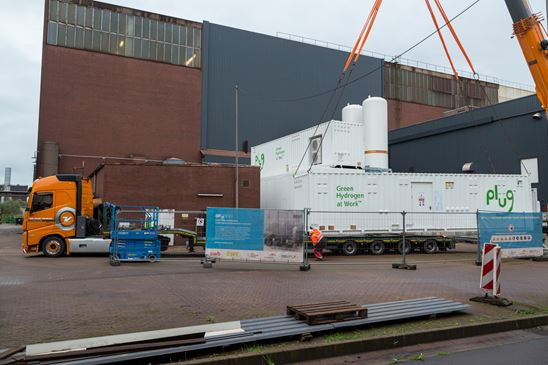On Tuesday, October 8, the HyBit project achieved a key milestone with the successful delivery of an electrolyzer in Bremen, marking a significant step forward in Northern Germany’s large-scale hydrogen initiative. The joint venture by swb, EWE, and ArcelorMittal Bremen aims to decarbonize steel production and significantly reduce CO2 emissions.
The electrolyzer, delivered from Farmsum, Netherlands, to Bremen-Mittelsbüren, arrived in two separate modules. The larger module, weighing 32 tons, will house the electrolysis process, while the smaller utility container, weighing 10 tons, will provide essential support services. The electrolyzer will produce green hydrogen by splitting water into hydrogen and oxygen using renewable electricity.
Dr. Karsten Schneiker, CEO of swb AG, expressed enthusiasm: “This delivery is a major step forward for the HyBit project. Our partnership with government, business, and science will enable significant CO2 reduction in Bremen, demonstrating our commitment to climate-friendly energy solutions.”
Stefan Dohler, CEO of EWE AG, highlighted hydrogen’s role in the energy transition, emphasizing its dual function as both an energy carrier and industrial material: “Green hydrogen is essential for replacing conventional energy sources and supporting industrial decarbonization.”
Dr. Thomas Bünger, CEO of ArcelorMittal Flachstahl Deutschland, noted the electrolyzer’s role in transforming steel production: “With this delivery, we are one step closer to climate-neutral steel production. The hydrogen generated will be integrated into our processes, helping to reduce emissions.”
The HyBit project, launched with the foundation stone in April 2023, represents a €20 million investment, including €10 million from the state of Bremen. Once operational, the electrolyzer will produce green hydrogen for use in ArcelorMittal Bremen’s steelworks, helping reduce CO2 emissions, and some of the hydrogen will also be transported to other locations such as hydrogen filling stations.
The 10 MW electrolysis plant is a cornerstone of green steel production in Northwest Germany, marking the beginning of industrial transformation toward sustainable practices.


